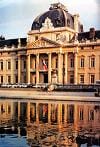You’re instantly on first-name terms, similar to what one would find in a Masonic brotherhood, they say. It’s kind of a “band of brothers” without needing to go through an actual battlefield or being strictly from the military. On Tuesday, January 20, 2009, uniforms in “Navy Blue” and “Land of France” with multiple rows of distinctive colonel ribbons—the “stars” reserved for general officers would come later—mixed with the more ordinary attire of a civilian population. Indeed, it’s within the premises of CICA, the International Center for Advanced Communication located in Sophia-Antipolis and graciously provided by the General Council of the Alpes-Maritimes, that the official opening of the 176th regional session of the Institute of Advanced Studies in National Defense takes place. This organization, under the auspices of the Prime Minister, aims to promote and disseminate a “defense spirit” through the organization of reflective work and the formulation of proposals on current issues related to international, defense, and security problems. The French presidency of the European Union necessitates an active role, and this year’s theme defines a perspective: “The European Union in search of internal and external security.”
Practical progression of the “operations”: over a period of 18 days spread over several weeks, selected on a general principle—one third military, one third civil servants, and the final third business leaders and civil personalities likely to be considered as opinion influencers—attendees called “auditors,” a status officialized by decree of the Prime Minister, follow conferences given by specialists and actively participate in successive debates at a sustained pace. They are split among six specific committees. At the end of one of the seminars in Genoa, designed to foster cohesion among the “auditors,” these participants will have to submit written works, results of their reflections that will be directly sent to Paris and will contribute—let’s dare to believe—to the military and political reflection as a whole.
In the list of auditors, available on the IHEDN website, we can note the presence of political figures such as the Chief of Staff of the Deputy Mayor of Nice, Jean-Robert Lefèvre, as well as Benoit Kandel and Jean-Pierre Mangiapan, respectively the First Deputy Mayor of Nice and his counterpart for Villefranche-sur-Mer. The participation of numerous academics, professors, and principals, such as Claudine Batazzi-Alexis, Lecturer at the IUT of Nice, attests to the priority given by the IHEDN’s leaders to education.
The Institute of Advanced Studies in National Defense has a “triple duty,” emphasized Colonel Alexandre Lalanne-Berdouticq, head of the “regional sessions” department: to enable the acquisition, reflection, and transmission of knowledge. As for the auditors, they must “shine in society or in their professional environments where they will spread the spirit of defense.” In this regard, keen to “raise awareness” among different populations in France, seminars are also set up for young people or professionals concerned with economic intelligence issues. “The defense of the Nation is everyone’s business,” the Colonel concluded before adding, “You are entering a large family.”
Despite the sometimes formal, if conventional nature of the initial interventions, this introductory day ultimately achieved its goal: to create contacts, provoke questions, and initiate debates. Given the sensitivity of the topics discussed, there is plenty to ponder.
Themes of the six working committees:
COMMITTEE 1: Is there a consciousness shared by the Mediterranean countries about the heritage represented by the mare nostrum? What concrete environmental measures have been adopted to protect this sea?
COMMITTEE 2: What international cooperation do you think is necessary to effectively combat maritime piracy in the Gulf of Aden?
COMMITTEE 3: How can a democracy committed to freedom of the press win the battle of communication? You will answer this question based on the example of France in Afghanistan and, conversely, the United States during the Vietnam War (1964-1973)
COMMITTEE 4: What are the challenges for implementing a European energy policy?
COMMITTEE 5: Do Huntington’s theses on the clash of civilizations seem relevant in light of the international context at the beginning of 2009?
COMMITTEE 6: Winning the war against terrorism: What dilemmas for democracies? Can Europe offer new insights into this issue?


